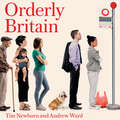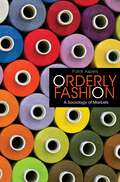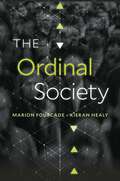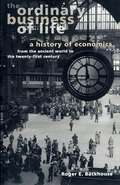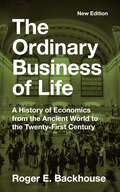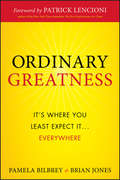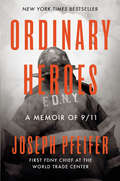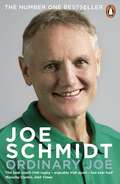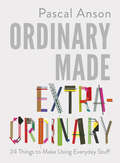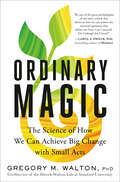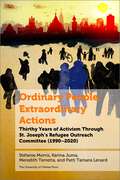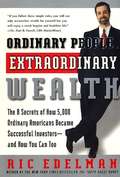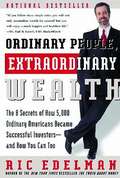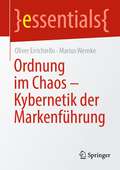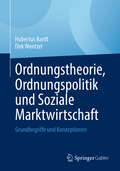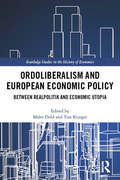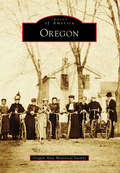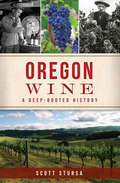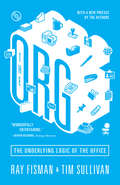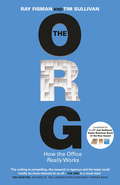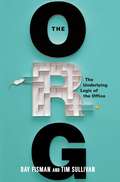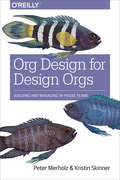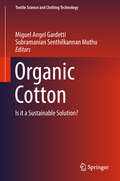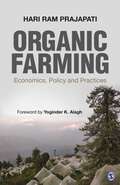- Table View
- List View
Orderly Britain: How Britain has resolved everyday problems, from dog fouling to double parking
by Tim Newburn Andrew WardHow do British pavements remain free of dog mess? Why are paths not littered with cigarette butts or roads not lined with abandoned cars? What does the decline of the public lavatory say about us and is the national reputation for queuing still deserved today?Orderly Britain takes a topical look at modern society, examining how it is governed and how it organises itself. It considers the rules of daily life, where they come from and why they exist. It asks whether citizens are generally compliant and uncomplaining or rebellious and defiant. This quirky social history takes a close look at shifting customs and practices, people's expectations of each other and how rule-makers seek to shape everyone's lives - even when ignoring some of those rules themselves.Taking the reader on a journey that covers a range of topics - dog mess, smoking, drinking, parking, queuing, toilets - Orderly Britain examines the rapidly changing patterns of everyday life, from post-war to present day, and concludes with an extended look at the unparalleled shifts in social routines that resulted from the global COVID-19 pandemic. Asking whether it is the proliferation of rules and regulations in the UK or something else that keeps people in line, authors Tim Newburn and Andrew Ward offer a unique insight into what creates orderly Britons.
Orderly Fashion: A Sociology of Markets
by Patrik AspersFor any market to work properly, certain key elements are necessary: competition, pricing, rules, clearly defined offers, and easy access to information. Without these components, there would be chaos. Orderly Fashion examines how order is maintained in the different interconnected consumer, producer, and credit markets of the global fashion industry. From retailers in Sweden and the United Kingdom to producers in India and Turkey, Patrik Aspers focuses on branded garment retailers--chains such as Gap, H&M, Old Navy, Topshop, and Zara. Aspers investigates these retailers' interactions and competition in the consumer market for fashion garments, traces connections between producer and consumer markets, and demonstrates why market order is best understood through an analysis of its different forms of social construction. Emphasizing consumption rather than production, Aspers considers the larger retailers' roles as buyers in the production market of garments, and as potential objects of investment in financial markets. He shows how markets overlap and intertwine and he defines two types of markets--status markets and standard markets. In status markets, market order is related to the identities of the participating actors more than the quality of the goods, whereas in standard markets the opposite holds true. Looking at how identities, products, and values create the ordered economic markets of the global fashion business, Orderly Fashion has wide implications for all modern markets, regardless of industry.
The Ordinal Society
by Marion Fourcade Kieran HealyA sweeping critique of how digital capitalism is reformatting our world.We now live in an “ordinal society.” Nearly every aspect of our lives is measured, ranked, and processed into discrete, standardized units of digital information. Marion Fourcade and Kieran Healy argue that technologies of information management, fueled by the abundance of personal data and the infrastructure of the internet, transform how we relate to ourselves and to each other through the market, the public sphere, and the state.The personal data we give in exchange for convenient tools like Gmail and Instagram provides the raw material for predictions about everything from our purchasing power to our character. The Ordinal Society shows how these algorithmic predictions influence people’s life chances and generate new forms of capital and social expectation: nobody wants to ride with an unrated cab driver anymore or rent to a tenant without a risk score. As members of this society embrace ranking and measurement in their daily lives, new forms of social competition and moral judgment arise. Familiar structures of social advantage are recycled into measures of merit that produce insidious kinds of social inequality.While we obsess over order and difference—and the logic of ordinality digs deeper into our behaviors, bodies, and minds—what will hold us together? Fourcade and Healy warn that, even though algorithms and systems of rationalized calculation have inspired backlash, they are also appealing in ways that make them hard to relinquish.
The Ordinary Business of Life: A History of Economics from the Ancient World to the Twenty-First Century
by Roger E. BackhouseIn some of Western culture's earliest writings, Hesiod defined the basic economic problem as one of scarce resources, a view still held by most economists. Diocletian tried to save the falling Roman Empire with wage and price fixes--a strategy that has not gone entirely out of style. And just as they did in the late nineteenth century, thinkers trained in physics renovated economic inquiry in the late twentieth century. Taking us from Homer to the frontiers of game theory, this book presents an engrossing history of economics, what Alfred Marshall called "the study of mankind in the ordinary business of life." While some regard economics as a modern invention, Roger Backhouse shows that economic ideas were influential even in antiquity--and that the origins of contemporary economic thought can be traced back to the ancients. He reveals the genesis of what we have come to think of as economic theory and shows the remarkable but seldom explored impact of economics, natural science, and philosophy on one another. Along the way, he introduces the fascinating characters who have thought about money and markets, including theologians, philosophers, politicians, lawyers, and poets as well as economists themselves. We learn how some of history's most influential concepts arose from specific times and places: from the Stoic notion of natural law to the mercantilism that rose with the European nation-state; from postwar development economics to the recent experimental and statistical economics made possible by affluence and powerful computers. Vividly written and unprecedented in its integration of ancient and modern economic history, this book is the best history of economics--and among the finest intellectual histories--to be published since Heilbroner's The Worldly Philosophers. It proves that economics has been anything but "the dismal science."
The Ordinary Business of Life: A History of Economics from the Ancient World to the Twenty-First Century - New Edition
by Roger E. BackhouseThe classic history of economic thought through the ages—now fully updated and expandedHesiod defined the basic economic problem as one of scarce resources, a view still held by economists today. Diocletian tried to save the Roman Empire with wage and price fixes—a strategy that has not gone entirely out of style. Roger Backhouse takes readers from the ancient world to the frontiers of game theory, mechanism design, and engagements with climate science, presenting an essential history of a discipline that economist Alfred Marshall called “the study of mankind in the ordinary business of life.” Backhouse introduces the many fascinating figures who have thought about money and markets down through the centuries—from philosophers and theologians to politicians and poets—and shows how today’s economic ideas have their origins in antiquity. This updated edition of The Ordinary Business of Life includes a new chapter on contemporary economics and the rest of the book has been thoroughly revised.
Ordinary Greatness
by Lencioni Patrick M. - NULL - Jones BrianHow to leverage ordinary greatness to create a competitive advantage for any organization Enabling readers to maximize leadership skills, no matter the venue, Ordinary Greatness helps those who are in leadership positions to optimize their organizational results by improving their ability to recognize and create greatness in those who they lead. Featuring real-world stories, this practical guide helps readers relate to both famous and everyday heroes and shows leaders how to improve their immediate environment. In addition, actionable tips and insights are included to equip business leaders to remove the blinders that keep them from seeing their organization's ordinary greatness. Pamela Bilbrey and Brian Jones are organizational consultants, executive coaches, and international speakers and workshop facilitators
Ordinary Heroes: A Memoir of 9/11
by Joseph PfeiferFrom the first FDNY chief to respond to the 9/11 attacks, an intimate memoir and a tribute to those who died that others might live <P><P> When Chief Joe Pfeifer led his firefighters to investigate an odor of gas in downtown Manhattan on the morning of 9/11, he had no idea that his life was about to change forever. A few moments later, he watched as the first plane crashed into the World Trade Center. Pfeifer, the closest FDNY chief to the scene, spearheaded rescue efforts on one of the darkest days in American history. <P><P> Ordinary Heroes is the unforgettable and intimate account of what Chief Pfeifer witnessed at Ground Zero, on that day and the days that followed. Through his eyes, we see the horror of the attack and the courage of the firefighters who ran into the burning towers to save others. We see him send his own brother up the stairs of the North Tower, never to return. And we walk with him and his fellow firefighters through weeks of rescue efforts and months of numbing grief, as they wrestle with the real meaning of heroism and leadership. <P><P> This gripping narrative gives way to resiliency and a determination that permanently reshapes Pfeifer, his fellow firefighters, NYC, and America. Ordinary Heroes takes us on a journey that turns traumatic memories into hope, so we can make good on our promise to never forget 9/11. <P><P><b>A New York Times Best Seller</b>
Ordinary Joe
by Joe Schmidt'He's a great coach. He lives and breathes the game. There's nothing he doesn't know' Brian O'Driscoll'The best coach Irish rugby - arguably Irish sport - has ever had' Malachy Clerkin, Irish TimesIn the autumn of 2010, a little-known New Zealander called Joe Schmidt took over as head coach at Leinster. He had never been in charge of a professional team. After Leinster lost three of their first four games, a prominent Irish rugby pundit speculated that Schmidt had 'lost the dressing room'.Nine years on, Joe Schmidt has stepped down as Ireland coach having achieved success on a scale never before seen in Irish rugby. Two Heineken Cups in three seasons with Leinster. Three Six Nations championships in six seasons with Ireland, including the Grand Slam in 2018. And a host of firsts: the first Irish victory in South Africa; the first Irish defeat of the All Blacks, and then a second; and Ireland's first number 1 world ranking.Along the way, Schmidt became a byword for precision and focus in coaching, remarkable attention to detail and the highest of standards. But who is Joe Schmidt? In Ordinary Joe, Schmidt tells the story of his life and influences: the experiences and management ideas that made him the coach, and the man, that he is today. And his diaries of the 2018 Grand Slam and the 2019 Rugby World Cup provide a brilliantly intimate insight into the stresses and joys of coaching a national team in victory and defeat.From the small towns in New Zealand's North Island where he played barefoot rugby and jostled around the dinner table with seven siblings, to the training grounds and video rooms where he consistently kept his teams a step ahead of the opposition, Ordinary Joe reveals an ordinary man who has helped his teams to achieve extraordinary things.'Rugby obsessives and amateur coaches will revel in the insight that Schmidt offers into his training methods, tactics and preparation ... Full of insight, emotion and considered analysis' Irish Daily Mail'An insight into the fascinating personality of the man who has been the single most influential figure in Irish rugby over the last decade' Irish Times'He is clearly more than an ordinary coach, the winning of two Heinekens, beating New Zealand twice, the 2018 Grand Slam and reaching no.1 in the World Rankings are positive brushstrokes, marking Irish rugby for ever ... A rocky read about exceptional deeds, told in extraordinary fashion' Irish Daily Star'Undoubtedly the greatest coach in Irish rugby history' Daily Telegraph
Ordinary Made Extraordinary
by Pascal Anson'Filled with inexpensive and relatively easy do-it-yourself design projects for the home. Step-by-step photos show you how to do everything from dipping vintage cutlery in paint and reupholstering an armchair in shoelaces to covering a wall in mirrors' - Telegraph 'True original Pascal Anson urges us, with winning wit and idiot-proof step-by-steps to turn ''dad'' jeans, an ugly table, holey trainers, mismatched cutlery [...] into desirable stuff using the alchemy of imagination. His brief? Low skill levels and high concept' - World of Interiors In Ordinary Made Extraordinary designer, artist and maverick-maker Pascal Anson shows how easy it is to transform everyday items into extraordinary statement pieces. Make ordinary a thing of the past with 24 inspiring and achievable projects including: - Create a chandelier with just a few rolls of Sellotape. - Cast a stunning concrete plant pot. - Build a child’s treehouse with cling film.There are ideas for projects for everyone – from repairing and reinventing worn out trainers, to bigger projects such as the wood-clad car and the stylish hairy chair.
Ordinary Magic: The Science of How We Can Achieve Big Change with Small Acts
by Gregory M. Walton PhD&“By one of the great psychologists of our time, a book that shows us how we can answer the universal questions that define our lives: Can I succeed? Do I belong? Am I loved?&”—Carol S. Dweck, PhD, bestselling author of Mindset Discover simple psychological shifts that build trust, belonging, and confidence—from the co-director of the Dweck-Walton Lab at Stanford University The emotional questions we face can define our lives. If you&’re expecting an interaction to go wrong, that expectation can make it so. That&’s spiraling down.But as esteemed Stanford psychologist Greg Walton shows, when we see these questions clearly, we can answer them well. Known to social psychologists as wise interventions, these shifts in perspective can help us chart new trajectories for our lives. They help us spiral up.This is ordinary magic: The ordinary experiences that help us set aside the ordinary worries of life to unleash extraordinary change.Through vivid storytelling and insightful analysis of fascinating research—both his own and others&’—Dr. Walton pulls back the curtain to reveal the magic at work:• With our children: The few choice words from a parent or a teacher that builds trust and achievement.• In our relationships: How the right opportunity to reflect, for just a few minutes before a conflict conversation, can engender greater intimacy among couples—even a year later.• In school: How learning that everyone feels as out of place at first as you do at a new school—they really do—can unleash extraordinary potential, improving your life a decade later.• In our policy: how a one-page letter reduced recidivism among kids returning to school from juvenile detention by 40 percentage points; a postcard campaign cut suicide rates in half.It&’s easy to think problems are out of our control. But in fact, we have vast opportunities for change. Ordinary Magic puts the tools for change at your fingertips.
Ordinary People, Extraordinary Actions: Refuge Through Activism at Ottawa’s St. Joe’s Parish (Politics and Public Policy)
by Stéfanie Morris Karina Juma Meredith Terretta Patti Tamara LenardWhat motivates “ordinary people” to support refugees emotionally and financially?This is a timely question considering the number of displaced people in today’s world is at an all-time high. To help counter this crisis, it is imperative for the Canadian government to determine which policies encourage volunteers to welcome asylum seekers, and which ones must be reviewed.Ordinary People, Extraordinary Actions relates the story of the St. Joseph’s Parish Refugee Outreach Committee over its thirty years in action, revealing how seemingly small decisions and actions have led to significant changes in policies and in people’s lives—and how they can do so again in the future.By helping readers—young and old, secular and faith-oriented—understand what drives individuals and communities to welcome refugees with open hearts and open arms, the authors hope to inspire people across Canada and beyond its borders to strengthen our collective willingness and ability to offer refuge as a lifesaving protection for those who need it.
Ordinary People, Extraordinary Wealth
by Ric EdelmanHow did a secretary, a firefighter, a retired naval officer, a housewife, a construction worker, a schoolteacher, and a pharmacist become wealthy? Bestselling author Ric Edelman has studied the wealth-making habits of these and 5,000 other ordinary Americans.What he found is revealed for the first time in this book: the eight great secrets to attaining wealth. This extraordinary book is filled with the advice of everyday people-people like your own friends and neighbors-who entered the world of personal finance, often with no real plan at the start, but who found ways to accumulate astonishing amounts of money. A rich, irreplaceable lifetime of wealthbuilding experience is now at your fingertips.Here you will learn to arrange your finances and make your investment decisions so you can reach your goals and achieve financial security. Including: How to turn your mortgage into a wealth-enhancing tool; Why small investments work better than big ones; How to max out on your employer-sponsored retirement plan; Your investments: when to hold them and when to fold them; Financial news: when to pay attention and when to turn it off; Plus, of course, much, much more.Let your neighbors lend you a hand and let Ric Edelman guide you through their lessons. So come along for an eye-opening journey with thousands of ordinary folks who found their way to extraordinary wealth. Five thousand of your neighbors found hard-won financial success using the same eight secrets to attaining wealth. The lessons they learned through many years of life experience, and lots of trial and error, can now be yours! After studying the habits of thousands of financially successful people, bestselling author Ric Edelman found that they shared eight fundamental methods for attaining wealth. Now you can adopt these same eight strategies yourself.Let the extraordinary experience of ordinary investors-along with Ric Edelman's expert analysis-help you create your own financial success story.
Ordinary People, Extraordinary Wealth: The 8 Secrets of How 5,000 Ordinary Americans Became Successful Investors--and How You Can Too
by Ric EdelmanHow did a secretary, a firefighter, a retired naval officer, a housewife, a construction worker, a schoolteacher, and a pharmacist become wealthy? Bestselling author Ric Edelman has studied the wealth-making habits of these 5,000 other ordinary Americans and reveals his findings in this extraordinary book that outlines in eight easy, practical steps to achieving and maintaining wealth. Here you'll find a lifetime of wealth-building experience from people just like you -- people who have figured out how to arrange their finances and make wise investment decisions so that they can reach their goals and achieve financial security. Plus, you'll find tips on How to turn your mortgage into a wealth-enhancing tool Why small investments work better than big ones How to max out on your employer-sponsored retirement plan When to hold investments and when to fold them When to pay attention to financial news and when to turn it off Let your neighbours lend you a hand. And let Ric Edelman guide you through their lessons in this eye-opening journey with thousands of ordinary folks who found their way to extraordinary wealth.
Ordinateurs: ...et matériel informatique! (Comment #76)
by Owen JonesOrdinateurs ...et matériel informatique! Les informations contenues dans cet ebook sur divers aspects des ordinateurs, des périphériques et des aspects connexes sont organisés en 21 chapitres d'environ 500 à 600 mots chacun. J'espère qu'il satisfera ceux qui s'intéressent aux ordinateurs, à Internet, aux périphériques, à l'électronique et à leur utilisation pratique. En prime, je vous autorise à utiliser le contenu sur votre site web ou sur votre site web ou dans vos propres blogs et newsletter, bien qu'il soit préférable que vous les réécriviez d'abord en vos propres termes. Vous pouvez également diviser le livre et revendre les articles. En fait le seul droit dont vous ne disposez pas est de revendre le livre ou l'offrir tel qu'il vous a été livré.
Ordnung im Chaos – Kybernetik der Markenführung (essentials)
by Oliver Errichiello Marius WernkeDie Kybernetik ist eine Wissenschaft, um Informationen zu verstehen und systematisch zu nutzen. Als Thema der Kybernetik wird die Marke gerade in Zeiten der Beschleunigung und der unendlichen, globalen Warenmärkte zunehmend wichtiger. Denn Bestand hat nur, wer vermag, sein Muster im Zeitalter der Veränderung zu bewahren und immer wieder an die Erfordernisse der Zeit anzupassen. Dabei helfen weder Kundendaten noch kreative Ideen, sondern eine fundierte Kenntnis der strukturellen Funktionsweise aller Lebewesen – organischer und sozialer. Durch die Zusammenführung von Markensoziologie und Management-Kybernetik werden in diesem essential die unsichtbaren sozialen Anziehungskräfte verdeutlicht. Indem die übergreifenden Dynamiken aller (lebenden) Systeme dargestellt werden, lassen sich universelle Erkenntnisse gewinnen und planvolle Strategien entwickeln.
Ordnungstheorie, Ordnungspolitik und Soziale Marktwirtschaft: Grundbegriffe und Konzeptionen
by Hubertus Bardt Dirk WentzelWas ist die Soziale Marktwirtschaft? Worauf baut sie auf und wie zukunftsoffen ist sie bezüglich der modernen globalen, ethischen und ökologischen Fragestellungen? Schaut man sich die Herausforderungen der Weltwirtschaft an, ist die Ordnungstheorie wichtiger denn je. Sie bestimmt unsere Existenz, Freiheit, Wohlstand und die Gestaltung der sozialen Sicherungssysteme. Damit sind Ordnungstheorie und Ordnungspolitik entscheidende Faktoren für die Anpassungsfähigkeit und Resilienz im Umgang mit Krisen, wie z.B. der Finanz,- der Migrations- und der Corona-Krise. Dieses Buch vermittelt zeitgemäß die wichtigsten Konzeptionen der Sozialen Marktwirtschaft von den philosophischen und ökonomischen Vordenkern bis hin zu aktuellen Anwendungsgebieten und ist dank Foliensatz ideal für den Einsatz an Schulen, Universitäten und sonstigen Bildungsstätten.
Ordoliberalism and European Economic Policy: Between Realpolitik and Economic Utopia (Routledge Studies in the History of Economics)
by Malte Dold Tim KriegerThis volume takes a broad perspective on the recent debate on the role of German ordoliberalism in shaping European economic policy before and after the eurozone crisis. It shows how ordoliberal scholars explain the institutional origins of the eurozone crisis, and presents creative policy proposals for the future of the European economy. Ordoliberal discourse both attempts to offer political solutions to socioeconomic challenges, and to find an ideal market order that fosters individual freedom and social cohesion. This tension between realpolitik and economic utopia reflects the wider debate on how far economic theory shapes, and is shaped by, historical contingencies and institutions. The volume will be of interest to policymakers as well as research scholars, and graduate students from various disciplines ranging from economics to political science, history, and philosophy.
Oregon (Images of America)
by The Oregon Area Historical SocietyOregon traces its beginnings back to 1841, when Bartley Runey built a log cabin just south of the village of Oregon along the �Old Lead Trail.� Primarily settled in the mid-1840s to 1850s, Oregon became a vibrant farming community. The railroad arrived in 1864 and provided a means of travel and transit, making Oregon the center of a much enlarged trade territory. By 1870, the population was 1,500, and many merchants, artisans, and tradesmen set up shop in the village to serve the needs of the community. Oregon was incorporated as a village in 1883. Following World War II, the coming age of the automobile with transportation and new highways and roads clearly marked Oregon�s change from an agricultural community to a suburban one. Today, Oregon is an active community with nationally recognized schools, parks, and sports and recreation programs. Oregon, Wisconsin, is home to two special landmarks: the official marker at Prairie Mound Cemetery for Nathaniel Ames, the area�s only Revolutionary War veteran, and the town�s World War I monument, believed to be the first World War I memorial in the United States.
Oregon Wine: A Deep-Rooted History (American Palate)
by Scott StursaThe history of winemaking in Oregon is steeped in legends so well known they've become gospel, but reality is even more fascinating. Discover the truth about who opened the state's first commercial winery and the real origin of Willamette Valley's famed Pinot Noir. Learn about Portland's daring Italian Americans, who kept home wineries during Prohibition, and the flourishing agriculture that contributed to the popularity of fruit wine. From the nineteenth-century winemakers through the modern industry that now includes more than seven hundred wineries, places like HillCrest and The Eyrie have been serving Oregonians for a half century. Uncover the forgotten roots of Oregon wine with author Scott Stursa and raise a glass to its prosperous future.
The Org
by Ray Fisman Tim SullivanWe create organizations because we need to get a job done--something we couldn't do alone--and join them because we're inspired by their missions (and our paycheck). But once we're inside, these organizations rarely feel inspirational. So where did it all go wrong?In The Org, Ray Fisman and Tim Sullivan explain the tradeoffs that every organization faces, arguing that this everyday dysfunction is actually inherent to the very nature of orgs. The Org diagnoses the root causes of that malfunction, beginning with the economic logic of why organizations exist in the first place, then working its way up through the org's structure from the lowly cubicle to the CEO's office.You'll learn:The purpose of meetings and why they will never go awayWhy even members of al Qaeda are required to submit travel and expense reportsWhat managers are good forHow the army and other orgs balance marching in lockstep with fostering innovationWhy the hospital administration--not the heart surgeon--is more likely to save your lifeWhy CEOs often spend more than 80 percent of their time in meetings--and why that's exactly where they should be (and why they get paid so much)
The Org: How The Office Really Works
by Ray Fisman Tim SullivanWhy do members of Al Qaeda have to submit travel and expense reports?How do you create incentives for policemen, or priests?What are managers good for?We create organizations because they are an efficient way of doing something we couldn't do alone. We join organizations because we are inspired by their mission, or their payslip. But once we're inside, these organizations rarely feel efficient or inspiring.In The Org, Ray Fisman and Tim Sullivan explain the trade-offs that every organization makes, arguing that this everyday dysfunction is in fact actually inherent in the very nature of orgs. Woven throughout The Org are fascinating stories of organizations ranging from Google and McDonald's, to Al Qaeda and the island nation of Samoa. The Org tells us how the office really works. As such it is required reading for anyone who wants to come to terms with the frustrations of their workplace, or to work their way up the org.
The Org: The Underlying Logic of the Office
by Tim Sullivan Ray FismanIn THE ORG, Ray Fisman and Tim Sullivan explain the tradeoffs that every organization faces, arguing that this everyday dysfunction is actually inherent to the very nature of orgs. THE ORG diagnoses the root causes of that malfunction, beginning with the economic logic of why organizations exist in the first place, then working its way up through the org's structure from the lowly cubicle to the CEO's office.Woven throughout with fascinating case studies-including McDonald's, al Qaeda, the Baltimore City Police Department, Procter and Gamble, the island nation of Samoa, and Google-THE ORG reveals why the give-and-take nature of organizations, while infuriating, nonetheless provides the best way to get the job done.You'll learn:The purpose of meetings and why they will never go awayWhy even members of al Qaeda are required to submit Travel & Expense reportsWhat managers are good forHow the army and other orgs balance marching in lockstep with fostering innovationWhy it's the hospital administration-not the heart surgeon-who is more likely to save your lifeThat CEOs often spend over 80% of their time in meetings-and why that's exactly where they should be (and why they get paid so much)Looking at life behind the red tape, THE ORG shows why the path from workshop to corporate behemoth is pockmarked with tradeoffs and competing incentives, but above all, demonstrates why organizations are central to human achievement.
Org Design for Design Orgs: Building and Managing In-House Design Teams
by Peter Merholz Kristin SkinnerDesign has become the key link between users and today’s complex and rapidly evolving digital experiences, and designers are starting to be included in strategic conversations about the products and services that enterprises ultimately deliver. This has led to companies building in-house digital/experience design teams at unprecedented rates, but many of them don’t understand how to get the most out of their investment. This practical guide provides guidelines for creating and leading design teams within your organization, and explores ways to use design as part of broader strategic planning.You’ll discover:Why design’s role has evolved in the digital ageHow to infuse design into every product and service experienceThe 12 qualities of effective design organizationsHow to structure your design team through a Centralized PartnershipDesign team roles and evolutionThe process of recruiting and hiring designersHow to manage your design team and promote professional growth
Organic Cotton: Is it a Sustainable Solution? (Textile Science and Clothing Technology)
by Miguel Angel Gardetti Subramanian Senthilkannan MuthuThis book highlights the traditional boundaries of the textile industry and discusses to what extent organic cotton is sustainable. It also examines the domestic and international influences of agricultural practices on cotton. Sustainability issues in the textile and fashion sectors require the influences that arise from beyond the boundaries of the conventional textile industry to be taken into account. These “external” influences—from (international or domestic) agricultural practices and energy policies to consumption patterns and levels of ecological notions of the society—have a significant impact on the sustainability of the textile and fashion sectors as a whole. Ecological and social concerns go far beyond individual companies and industries; therefore, in order to become more sustainable, the textile (and fashion) industry needs to address these concerns appropriately and connect with other disciplines, industries, communities, and international groups.
Organic Farming: Economics, Policy and Practices
by Hari Ram PrajapatiOrganic farming has experienced steady growth in terms of production, number of growers, area under cultivation and rise in use of organic inputs across India and Asia in general in recent times. It has gradually emerged as a viable substitute for the high-cost, high-polluting mechanized farming prevalent in many parts of the world, including India. This book starts with an extensive description of the economics of organic farming. Food products are grown by two groups—conventional growers, who target the mass market, and organic growers who target either the ‘niche urban market’ or the worldwide export market. The demand for major organic food items such as milk, meat, eggs and dairy products is growing rapidly in national urban and international markets. On the other hand, the conventional grower has a large share of both national and international markets. The book clearly differentiates between the economics of these two product and farming types. The book closely analyses why some Indian states are doing better than others and why some countries are doing better than others in Asia in organic farming. It describes the state-wise growth of the organic market in India as a result of the proactive policies and actions of states which are more successful than others. The book also presents exhaustively the international organic farming rules and regulations based on four principles—health, ecology, fairness and care, which constitute the basis for the formulation of rules and regulations by all countries, which in turn further enable the expansion and development of organic farming along scientific and democratic lines.
